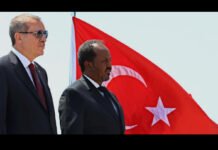By HAN News Desk
MOGADISHU — Confidential information obtained by Horn Africa News indicates that the Federal Government of Somalia is preparing new aviation measures that would require all international flights to either arrive in or depart from Mogadishu before traveling to other cities across the country.
The proposed regulation, according to senior government sources, is part of a broader plan to strengthen national sovereignty and centralize airspace management under the federal authority.
Officials say the move aims to reaffirm that Somalia is governed by one central government, rather than multiple regional administrations acting independently. If implemented, the new system would effectively end the practice whereby some international flights have been coordinated directly by regional states, bypassing federal oversight.
Analysts believe the measure is designed to curb what the government views as repeated violations of Somali sovereignty by certain regional administrations that have been managing air traffic and granting flight permissions independently.
The policy is expected to have direct implications for Puntland and Somaliland, where regional authorities have long exercised separate control over their airports and airspace. The federal government argues that such practices contradict Somalia’s constitution and international aviation standards.
A senior official who spoke to Horn Africa News on condition of anonymity said:
“This decision sends a clear message — Somalia has one national government, one airspace, and one flag. Any international flight entering the country must comply with federal regulations.”
The move comes amid increasing political tensions between Mogadishu and several federal member states over issues of autonomy, resource control, and international representation.
Aviation experts, however, have cautioned that the federal government will need to ensure coordination with regional airports to avoid disruptions to domestic and international travel.
If successfully implemented, the policy could mark a significant step in the federal government’s ongoing efforts to reassert national unity and restore centralized control over key sectors of governance, including airspace, natural resources, and foreign relations.




